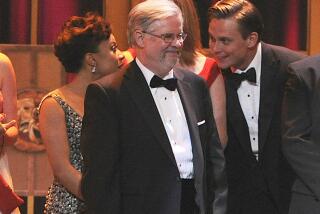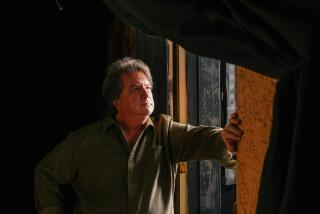Column: Tennessee Williams: What three lesser known works say about the playwright’s legacy
No point in mincing words: Tennessee Williams is the greatest playwright America has ever produced. Yet more and more his reputation seems preserved in amber rather than renewed through revelatory revivals.
Somebody somewhere is always presenting “The Glass Menagerie,” an inviting vehicle for commanding actresses of a certain age. “A Streetcar Named Desire” and “Cat on a Hot Tin Roof,” harder to figure out on stage, tempt actors with their glorious precedents.
For the record:
8:54 a.m. April 26, 2024An earlier version of this article misidentified the set designer for the Fountain Theatre production of “Baby Doll.” The set was designed by Jeffrey McLaughlin, not John Iacovelli.
Rarely do productions of these classics, however, force us to reexamine our longstanding acquaintance with this Southern gothic writer who wore his wounded heart on his sleeve. Perhaps this explains my strange hopefulness whenever anyone brave enough decides to do one of the flops from Williams’ self-described “stoned age,” that period when Broadway critics rued that he was only on parole and not in their detention center.
Surely there are other versions of Williams left to discover. But even if there aren’t, it is still possible to learn as much about a great artist from his failures as from his successes.
See the most-read stories in Entertainment this hour »
This is the frame of mind I would recommend to theatergoers curious about the accidental Williams festival happening in intimate theaters across town. It’s not every summer that brings us productions of “Kingdom of Earth” (at the Odyssey Theatre through Aug. 14), “The Eccentricities of a Nightingale” (at the Pacific Resident Theatre through Sept. 25) and “Baby Doll” (at the Fountain Theatre through Sept. 25).
How does Williams speak to us today? If you read John Lahr’s lauded biography, “Tennessee Williams: Mad Pilgrimage of the Flesh,” you might believe that the ultimate purpose of Williams’ work is to shed psychoanalytic light on the inner conflicts of a playwright who never met an addiction (booze, pills, sex) he didn’t like. Yet clearly there has to be more to the work or we wouldn’t be insatiably interested in the author.
There isn’t a secret masterpiece in this crop of Williams offerings, but experiencing these dramas in the span of a week brought me closer to Williams the working playwright.”
— Charles McNulty
There isn’t a secret masterpiece in this crop of Williams offerings, but experiencing these dramas in the span of a week brought me closer to Williams the working playwright — a writer who couldn’t stop expressing his sensibility (a wicked mix of felt poetry and flamboyant comedy) even when the results were erratic, to put it kindly.
Anyone attending these productions shouldn’t have trouble identifying Williams’ great subject — the place of sex in our lives. The issue is as central to his thinking as it was to Freud’s, though Williams, believing each of us is “sentenced to solitary confinement inside our own skins” (to quote Val from “Orpheus Descending”), took a more existentialist view. So much of the discussion of this thematic material is colored by our knowledge of Williams’ personal disasters (which he was more than happy to publicize), but the erotic dimension of the plays is where you’ll find his artistic worldview.
For the female characters of “Kingdom of Earth,” “The Eccentricities of a Nightingale” and “Baby Doll,” sex is a vehicle for liberation — liberation from conformity and convention, from brutalizing hypocrisy and patriarch oppression. At the same time, carnality poses risks of dissipation and victimization. How quickly the sweetness of sensuality can sour with exploitation, moralizing mean-spiritedness and romantic folly.
“The Eccentricities of a Nightingale” is Williams’ reworking of “Summer and Smoke,” a play that was very dear to his heart but one that he felt he never got right (despite José Quintero’s 1952 landmark revival starring Geraldine Page that lent prestige to the then-burgeoning off-Broadway theater). Williams claimed to prefer his rewrite, though “Eccentricities” is seldom done. The play doesn’t so much solve the problems of “Summer and Smoke” as create a whole new set of them.
But they are intriguing problems, and Williams gets to return to Alma, the character he identified as his favorite to Playboy magazine —“because I came out so late and so did Alma, and she had the greatest struggle, you know?” Williams is referring to Alma’s belated embrace of her sexuality. Daughter of a minister, she suffers from heart palpitations and other symptoms of hysteria, all of which are exacerbated by her love for the boy next door, John Buchanan, who has returned from medical school in a blaze of glory.
In “Summer and Smoke,” Williams made John a licentious figure, the playboy to Alma’s puritan. The conflict was schematically handled (she was all soul, he was all flesh), and the play devolved into melodrama, rescued only by Williams’ lyrical compassion for his heroine’s plight.
In “Eccentricities,” Alma (sensitively played by Ginna Carter) is still having trouble catching her breath and still being berated by her father, the Rev. Winemiller (a perfectly overbearing Brad Greenquist) for her affectations. But she is no longer the church singer who takes offense when John (a charismatic Andrew Dits) makes a pass at her. And he’s no longer a wastrel, but a self-aware young man weighed down by his mother’s over-the-top adoration.
The production, directed by Dana Jackson, allows Carter and Dits to fully inhabit each moment of their interaction, culminating in a motel scene suffused with tender sadness. Jackson’s staging is too sluggish to make a persuasive case for “Eccentricities,” which comes to life only flickeringly in scenes.
The plot, such as it is, tracks the way desire transforms Alma’s character from bottled-up spinster to a woman who hangs around a public square by herself at night. Carter’s intelligent delicacy goes a long way toward clarifying this curious psychological journey. She speaks with a hesitancy as though Alma’s suppressed passion were lodged in her throat. But the awkward way Williams leavens the seriousness of his play with comedy that blurs from satire to parody makes this a challenging play to act.
“Kingdom of Earth,” one of Williams’ most notorious Broadway bombs (known also as “The Seven Descents of Myrtle”), continues Williams’ meditation on the clash between the physical and the spiritual, but the atmosphere here is too debased for any realm to be idealized for long.
Set in a Mississippi Delta farmhouse that Williams described as having “the mood of a blues song whose subject is loneliness,” the play revolves around one of the craziest romantic triangles Williams ever invented, which is saying something.
Lot (Daniel Felix de Weldon) has returned freshly married to the house he inherited when his mother died. His wife, Myrtle (Susan Priver), is a good-natured but none-too-bright dime-store model/pre-reality-TV wannabe celebrity who has a genius for taking the wrong turn in life.
Myrtle’s instincts have failed her once again: Her effete husband with the dyed blond hair is dying of tuberculosis and the house is in the path of an imminent flood. Compounding her woes with menace, Lot’s half-brother, Chicken (Brian Burke), the farm’s angry and animalistic caretaker, is determined to enforce an agreement that turns the house over to him when Lot dies.
Michael Arabian’s production nearly convinced me that “Kingdom of Earth” was one of Williams’ hidden gems. John Iacovelli’s set creates a universe unto itself, a forgotten hideaway perilously perched at the extreme edge of the old South.
Two of the roles are perfectly cast. De Weldon’s languorous portrayal of self-preening Lot is an instance of unimpeachable camp — he touches up the roots of his tinted locks as reverently as he fondles his mother’s precious crystal — and Priver’s Myrtle delightfully magnifies the character’s misguided maternalism, balancing aching sincerity with seedy humor.
Burke is a fine actor but he’s miscast as Chicken. The primal lustiness of the character doesn’t come through in the way Williams intends. Burke’s Chicken isn’t even sickeningly alluring — he’s just off-putting. And the cuts that have been made to the play (the production runs 90 intermission-less minutes) diminish our understanding of his pivotal role.
“Kingdom of Earth” began as a short story told from Chicken’s point of view. The play’s title, in fact, refers to Chicken’s vision of paradise, a more realistic (albeit heretical) alternative to heaven. Arabian’s production tilts the play toward Lot and Myrtle, and while their performances make the experience richly entertaining, the play’s meaning fails to come through. Yet I confess I left the Odyssey wishing that Center Theatre Group or the Geffen Playhouse would invite Arabian to re-stage his production.
“Baby Doll” is an adaptation by Pierre Laville and Emily Mann of Williams’ screenplay for Elia Kazan’s 1956 film with Karl Malden, Carroll Baker and Eli Wallach. The movie was an elaboration of Williams’ one-act “27 Wagons Full of Cotton.” Kazan claimed that he put the script together himself, and the film, which was made famous by controversy (Cardinal Francis Spellman, offended by the steamy depiction of extramarital funny business, forbade Catholics from seeing it), represents a fusion of Kazan’s and Williams’ sensibilities.
The Fountain production, directed by Simon Levy, has a significant problem: “Baby Doll” is expansive and the set by Jeffrey McLaughlin seems cluttered and cumbersome in the theater’s tight confines. “27 Wagons Full of Cotton,” which concentrates on the erotic shenanigans between Baby Doll, the childlike wife of Archie Lee Meighan, and Silva Vacarro, the handsome Sicilian manager of a rival cotton gin that was putting Archie out of business until he burned it down, would have suited the space better.
The production, however, has a secret weapon in Lindsay LaVanchy, who draws out all the sensuality and sadness, the petulance and helplessness of Baby Doll, the 19-year-old virgin who still sleeps in a crib to fend off her yucky older husband. She coos and pouts and stomps around like a fairy tale princess immured in a tower, but she lets the bars of her bed down for Silva (Daniel Bess, supplying the necessary beefcake) when he threatens to stop playing with her.
This is yet another in Williams’ gallery of female figures who see the possibility of escape in a union more enticing than her current bargain. LaVanchy allows us to once again hope that maybe this time romance will live up to its promise and quench the lonely longing.
Although skeptical about religion and its repressive demands, Williams maintained an open mind when it came to spirituality, believing that sex could lead one to God perhaps even more directly than sublimation and sacrifice. Like his hero D.H. Lawrence, who Williams wrote “felt the mystery and power of sex, as the primal urge,” Williams was a preacher of an embodied gospel of love.
His work might be “chaotic and distorted by tangent obsessions,” as he said about Lawrence’s writing, but it is one of the great monuments “to the dark roots of creation.” And Williams was just as powerful an “adversary” of those who’d like to keep the subject of sex “locked away in the cellars of prudery.” Indeed, even his second-tier efforts, as these productions attest, cast a poetic spell encouraging us to appreciate anew this dimension of our shared mortality.
More to Read
The biggest entertainment stories
Get our big stories about Hollywood, film, television, music, arts, culture and more right in your inbox as soon as they publish.
You may occasionally receive promotional content from the Los Angeles Times.







